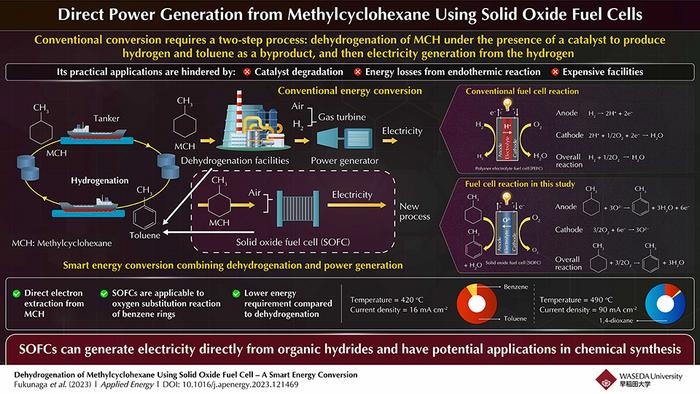Methylcyclohexane (MCH), a type of organic hydride, is expected to be an excellent hydrogen carrier because it remains liquid at room temperature, is easy to transport, has low toxicity, and has a higher hydrogen density than high-pressure hydrogen. Dehydrogenation—the process of removing hydrogen atoms from molecules—in the presence of a catalyst, yields hydrogen and the byproduct toluene, which can then be used to generate electricity to produce CO2-free power. However, the dehydrogenation reaction is an endothermic reaction, and energy loss as well as the facilities required for the reaction are issues.

Credit: Akihiko Fukunaga from Waseda University
Methylcyclohexane (MCH), a type of organic hydride, is expected to be an excellent hydrogen carrier because it remains liquid at room temperature, is easy to transport, has low toxicity, and has a higher hydrogen density than high-pressure hydrogen. Dehydrogenation—the process of removing hydrogen atoms from molecules—in the presence of a catalyst, yields hydrogen and the byproduct toluene, which can then be used to generate electricity to produce CO2-free power. However, the dehydrogenation reaction is an endothermic reaction, and energy loss as well as the facilities required for the reaction are issues.
Recently, a team of researchers from Japan, led by Professor Akihiko Fukunaga from the Department of Applied Chemistry at Waseda University, has succeeded in generating electricity directly from MCH using solid oxide fuel cells (SOFC). Their work was made available online on July 4, 2023 in Volume 348 of Applied Energy.
The research team tried to perform two processes simultaneously in a fuel cell: dehydrogenation from organic hydrides, which is an endothermic reaction, and electricity generation, which is an exothermic reaction. To achieve this, they used an anode-supported solid oxide fuel cell with a higher operating temperature than that of a polymer electrolyte fuel cell. They operated it at a temperature that did not allow pyrolysis of organic hydrides and under conditions that prevented carbon deposition at the electrodes. The production ratio of toluene to benzene was 94:6. This achievement demonstrated the possibility of generating electricity without using dehydrogenation facilities which were conventionally required and using less energy than that required for dehydrogenation reactions using catalysts.
In addition, “It was elucidated that by changing the conditions, oxygen groups could be introduced into the aromatic skeleton using a fuel cell” reveals Fukunaga.
These results indicate that the MHC reacts with the conducting oxygen ions in the SOFC to successfully generate electricity. Thus, power can be generated directly from MHC, and the energy required for direct power generation is lesser than that required for the conventional catalyst-assisted dehydrogenation reaction of MCH.
“Fuel cells have been studied and developed as devices that produce highly efficient, carbon-free electricity through the electrochemical reaction of hydrogen and oxygen. In this study, we have demonstrated that this device can be applied to control dehydrogenation reactions from organic hydrides and oxygen substitution reactions of aromatic rings. In the future, new synthetic chemistry may be created by applying fuel cells.” concludes Fukunaga. Here’s hoping that the proposed technology will pave the way to a sustainable hydrogen-based society!
***
Reference
DOI: https://doi.org/10.1016/j.apenergy.2023.121469
Authors: Akihiko Fukunaga1, Asami Kato1, Yuki Hara1, and Takaya Matsumoto
Affiliation: 1Department of Applied Chemistry, Waseda University
About Waseda University
Located in the heart of Tokyo, Waseda University is a leading private research university that has long been dedicated to academic excellence, innovative research, and civic engagement at both the local and global levels since 1882. The University has produced many changemakers in its history, including nine prime ministers and many leaders in business, science and technology, literature, sports, and film. Waseda has strong collaborations with overseas research institutions and is committed to advancing cutting-edge research and developing leaders who can contribute to the resolution of complex, global social issues. The University has set a target of achieving a zero-carbon campus by 2032, in line with the Sustainable Development Goals (SDGs) adopted by the United Nations in 2015.
To learn more about Waseda University, visit https://www.waseda.jp/top/en
About Professor Akihiko Fukunaga from Waseda University
Dr. Akihiko Fukunaga is a Faculty of Science and Engineering at the School of Advanced Science and Engineering at Waseda University in Japan. He received his Ph.D. from Waseda University in 1999 and has been a Professor of Applied Chemistry there since 2019. Prior to that, he worked at JXTG Nippon Oil & Energy Corporation from 1984 to 2019, where he successfully commercialized the residential fuel cell system, EneFarm. His research interests include energy materials, hydrogen, fuel cells, and carbon recycling.
Journal
Applied Energy
DOI
10.1016/j.apenergy.2023.121469
Method of Research
Experimental study
Subject of Research
Not applicable
Article Title
Dehydrogenation of Methylcyclohexane Using Solid Oxide Fuel Cell – A Smart Energy Conversion
Article Publication Date
4-Jul-2023
COI Statement
The authors declare that they have no known competing financial interests or personal relationships that could have appeared to influence the work reported in this paper




